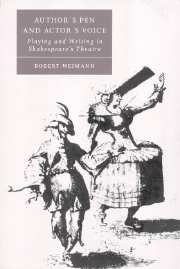Book contents
- Frontmatter
- Contents
- Preface
- Introduction: conjunctures and concepts
- 1 Performance and authority in Hamlet (1603)
- 2 A new agenda for authority
- 3 Pen and voice: versions of doubleness
- 4 Playing with a difference
- 5 Histories in Elizabethan performance
- 6 Hamlet and the purposes of playing
- 7 Space (in)dividable: locus and platea revisited
- 8 Shakespeare's endings: commodious thresholds
- Afterword: thresholds forever after
- Notes
- List of works cited
- Index
Afterword: thresholds forever after
Published online by Cambridge University Press: 22 September 2009
- Frontmatter
- Contents
- Preface
- Introduction: conjunctures and concepts
- 1 Performance and authority in Hamlet (1603)
- 2 A new agenda for authority
- 3 Pen and voice: versions of doubleness
- 4 Playing with a difference
- 5 Histories in Elizabethan performance
- 6 Hamlet and the purposes of playing
- 7 Space (in)dividable: locus and platea revisited
- 8 Shakespeare's endings: commodious thresholds
- Afterword: thresholds forever after
- Notes
- List of works cited
- Index
Summary
I cannot resist the temptation to conclude with an epilogue that takes up on the very threshold where the last chapter has broached a discussion about the postscriptural future of verbal artifacts. What a good many Shakespearean endings aimed at was to suspend the play, after it had ended, in an off-stage action of a sort, in speech acts which, more than anything, rehearsed the memory of what was seen and heard, pointing beyond the time and place of the theatrical occasion. The recollection – derived as it was from performance of persons and stories, not from a printed playtext – harbored knowledge of a particular kind. It was knowledge ‘of’ rather than a knowledge ‘that.’ Such knowledge had some of the immediacy of what was felt, a resonance that invited response. The idea was for spectators to take away images of the story-world and the thrill over the work of “our Actors” which, in John Webster's phrase, would “give them [the “Actors”] authority to play.” The audience, as Terence Hawkes notes, left the playhouse with “the speech of the play on the stage as part of the oral reality of the speech of life off-stage” (Shakespeare's Talking Animals 56). Such postscriptural uses of the products of writing and playing entertained what Homi Bhabha in The Location of Culture calls “a priority of eye over inscription, or voice over writing, that insists on the ‘image’ of knowledge as confrontation between the self and the object” (127).
- Type
- Chapter
- Information
- Author's Pen and Actor's VoicePlaying and Writing in Shakespeare's Theatre, pp. 246 - 250Publisher: Cambridge University PressPrint publication year: 2000



